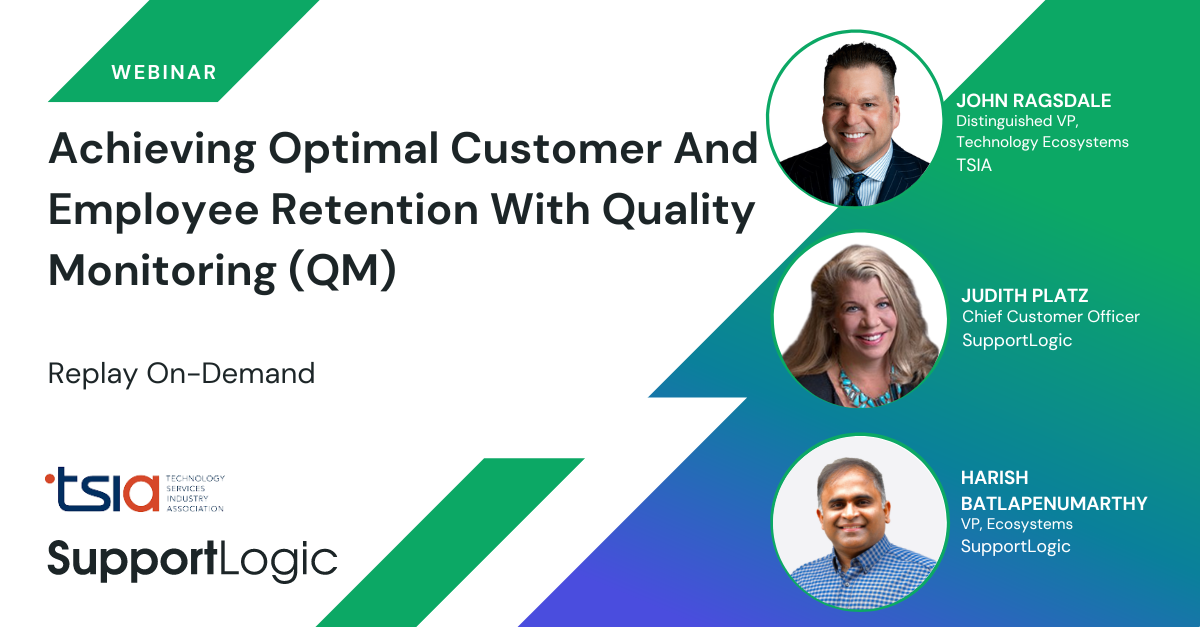
Jul 21, 2023
Recharge Your Support Team With Agent Coaching
Support Quality Monitoring Toolsquality assurancequality monitoringagent coaching
Whether you’ve followed a basketball team’s journey to the playoffs or watched a documentary about a legendary football team, you likely saw strong coaching in action. An effective coach empowers their team to bring their A-game, and in the end, everyone wins—the players, the coach, the franchise, and the fans.
Customer service can experience the same win-win effect when agent coaching is part of the support process. Agent coaching is one of the steps involved in customer service quality assurance and gives agents the tools, feedback, encouragement, and support they need to do their jobs well. Even the best agent messes up once in a while, and coaching helps enhance the agent and customer experience.
To better understand the role agent coaching plays in the customer support experience, we talked to Harish Batlapenumarthy, VP of Ecosystem at SupportLogic.
Benefits of agent coaching
Effective coaching is good for your agents’ well-being and their ability to solve customers’ problems. It also improves the overall customer experience (CX)—as well as your business’s bottom line.
Happier, more capable agents
When agents are equipped with knowledge, tools, and support, they’re able to do their jobs efficiently and with a heightened sense of motivation. Coaching also helps agents feel more confident and become more skilled at their craft, resulting in fewer escalated cases.
“Coaching is super important for continuous improvement,” Batlapenumarthy said.
However, agent experience sometimes suffers for the sake of CX. “The customer is always right” isn’t just an old adage—it’s an ideal that many businesses have adopted, sometimes at the expense of the employees who actually deal with the customers.
As it turns out, happy agents mean happy customers. This study found a strong link between employee well-being and customer satisfaction. And having a coaching and quality monitoring process in place can help maintain a high level of employee satisfaction.
Managers better understand agents’ needs
Agent coaching gives managers insight into where agents are struggling, so they can drill down and find the root of the issue. It can also reduce turnover because managers are investing in agent retention rather than onboarding new people—which is time-consuming and expensive.
An automated agent coaching tool like SupportLogic’s Elevate SX extracts qualitative and quantitative performance metrics, so managers can act promptly and proactively when an issue arises.
“Our tool makes it very easy for the managers to understand what areas agents are struggling in and what areas they’re good at,” Batlapenumarthy explained.
For example, say a support manager checks their automated QA and agent coaching dashboard and sees that two of the six key areas being tracked are in need of improvement. It’s then easy for the manager to focus on those specific areas of concern and see exactly which cases this agent struggled with.
“So, at a macro level, we tell them what areas agents need coaching on,” Batlapenumarthy said. “At a micro level, we tell them exactly which cases or which tickets they were weak on.”
Improved customer support experience
The more consistent the agent coaching is, the better trained the agents are, allowing them to deliver world-class customer service.
And the importance of a good customer support interaction can’t be overstated—66% of consumers said a bad interaction with customer support could ruin their day. No one wants that.
In contrast, 92% of consumers say they’re more likely to make additional purchases following a positive customer service experience.
How real-time coaching insights boost customer service center performance
More time spent manually monitoring calls means less time coaching agents and fewer chances for customers to leave feeling satisfied. An automated quality assurance and agent coaching tool measures customer interactions as soon as they happen and provides detailed analysis for improved coaching efforts.
Automated monitoring provides the full scope
A small sampling of agents’ interactions might provide them with some helpful feedback, but it doesn’t always provide the full picture.
Say you randomly choose two calls an agent dealt with in the last week that were flagged as negative, but the agent resolved more than 100 calls that week. Unfortunately, those two interactions don’t thoroughly represent the support agent’s overall performance, which can make them feel like they’ve been evaluated unfairly.
Automated tools analyze 100% of agent interactions, meaning managers have all the relevant information needed for coaching, and agents don’t feel like their evaluations are subjective.
“It’s not some person thinking randomly or feeling—there are no feelings here anymore,” Batlapenumarthy explained. “It’s very data-driven.”
Reduced agent attrition
Agents who receive accurate and direct feedback almost immediately are better equipped to do their job, which may help them feel less stressed. Additionally, when agents feel valued, you can reduce agent attrition, an ongoing challenge, as Batlapenumarthy says the call center industry sees a churn rate of up to 35%.
“The job is obviously very stressful by definition,” he explained. “They’re being yelled at constantly, so they get fed up. They can’t handle it anymore. And they don’t get any feedback. So, coaching is super important.”
Say an agent feels like they’ve had a strong month. But at their monthly evaluation, they’re surprised to learn they were actually underperforming in some key areas. This revelation affects their confidence—they’re left wondering why a manager didn’t step in sooner and let them know what the problem was and how they could have fixed it. Real-time coaching eliminates these surprises and allows agents to always know where they stand.
More time to focus on what matters
Manual quality assurance monitoring is extremely laborious and time-consuming. With automation doing the heavy lifting of monitoring and analyzing every interaction, managers can spend less time bogged down with manual tasks.
This allows more time for one-on-one agent coaching with more valuable and specific insights to share. And that leads to more bandwidth to focus on improving customer experience.
Five coaching best practices
Implement these steps into your agent coaching so you can help your contact center agents help themselves—and your customers.
Role-play
By acting out a role-play scenario, agents can go over how they’d deal with common customer issues and receive feedback in the moment. After all, there’s a reason actors rehearse their lines before going on stage or in front of a camera.
Role-play can also help calm agents’ nerves. For example, if a customer asks a question an agent has gone over in role-play, they don’t have to worry about coming up with the right response or remembering brand standards—they can flash back to training.
You can play the “angry customer” role while your agent demonstrates how they’d handle the call. Role-playing is a great way to explore different situations and prepare agents for various interactions.
Encourage soft skill development
Hard skills—like the ability to properly use your software—are important for customer support agents. But managers should also encourage soft skills in agents to help them get along with customers.
Some examples of soft skills include:
- Independence
- Empathy
- Problem-solving
- Listening
- Flexibility
You can approach soft-skill training in several ways. For example, you can take a self-study approach by providing agents with videos to watch or materials to read, followed by quizzes. You can also hold group discussions using case studies to identify where soft skills were beneficial or could have resulted in a better outcome.
Be specific with feedback
If you’re vague with your feedback, agents might not understand exactly where and why they need to improve. By showing them accurate, objective metrics like their first call resolution (FCR), they can grasp which area needs more focus and why.
Using real numbers drives the point home that the review is objective and not personal. Saying, “Your customer satisfaction score has been pretty low recently,” isn’t as helpful as, “In the last month, your customer satisfaction score is down by 47%.” In the same vein, use specific examples. Pull a call and point out the exact moment a conversation went in the wrong direction.
Provide actionable ways for agents to improve. For example, if an agent is repeatedly unable to answer questions about your brand, give them company resources so they can become as familiar as possible with messaging.
Point out the positives
Coaching is not only about identifying improvement opportunities but also about areas where agents are getting it right. Indicate their strong points where they consistently receive positive scores and feedback, so they can maintain that strength and feel good about themselves at the same time.
For example, if one of your agents is struggling with a high customer churn rate, start your coaching session positively by highlighting an area they’ve recently improved in. Agents may feel more receptive to constructive criticism if they’re also recognized for their strengths.
Create a QA scorecard or checklist
A customer service quality assurance checklist helps you keep agents on track with the internal standards you’ve set. This checklist, also called a scorecard, is a rubric that helps you efficiently coach agents based on their strengths or weaknesses.
The list of standards your agents follow will include key metrics like customer satisfaction (CSAT) score, first call resolution, and average handle time (AHT), which all look at how effectively agents are resolving issues and keeping customers happy.
Take a proactive approach to agent coaching
Instead of reacting to conversations between agents and customers that may have taken place weeks ago, take charge of agent coaching in the moment. Elevate SX provides real-time insights from conversations between agents and customers that allow you to see the full scope of an agent’s performance and guide them toward consistent improvement.
To see automated agent coaching in action, take a test drive of Elevate SX today.
Don’t miss out
Want the latest B2B Support, AI and ML blogs delivered straight to your inbox?



